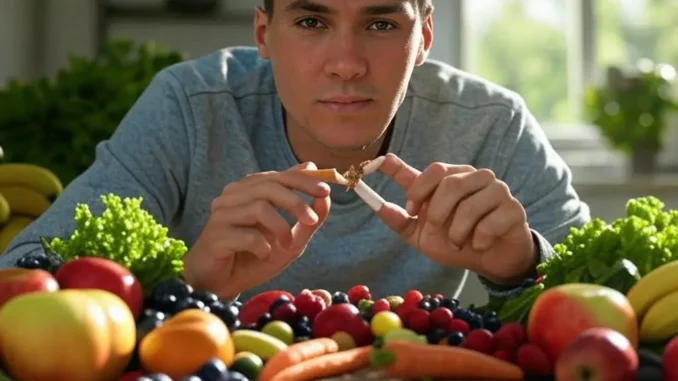
Introduction
Bad habits can weigh heavily on both our physical and mental well-being. Whether it’s the struggle to quit smoking, an addiction to sugary foods, or other detrimental behaviors, breaking these patterns is essential for long-term health. In this post, we explore the focus keyword “Breaking Bad Habits” and share 7 incredible ways to help you quit smoking, reduce sugar consumption, and ultimately stay healthy. With practical tips and motivational strategies, you can overcome these challenges and transform your life.
1. Recognize and Understand Your Habits
The first step in breaking bad habits is awareness. Identify the triggers and routines that lead you to smoke or consume excessive sugar. Keeping a journal can help pinpoint the times and emotions that drive these behaviors.
- Tip: Note your daily patterns for at least a week. Recognizing these habits is key to changing them.
2. Set Clear, Achievable Goals
Establish specific, realistic goals for quitting smoking and reducing sugar. Instead of vague resolutions, set measurable targets. For instance, aim to cut down cigarette consumption by a certain number per week or replace sugary snacks with healthier alternatives.
- Practical Advice: Write down your goals and revisit them regularly to track your progress.
3. Create a Supportive Environment
Your environment plays a crucial role in your success. Remove triggers from your home and workplace. For smokers, this may mean keeping cigarettes out of sight; for sugar lovers, it could be clearing your pantry of sweets.
- Internal Link Suggestion:
Learn more about building a supportive lifestyle with our guide on healthy lifestyle habits. - External Link Suggestion:
For expert advice on smoking cessation, visit CDC – Smoking & Tobacco Use.
4. Replace Negative Habits with Positive Ones
Substitution is a powerful tool. Replace smoking with activities that bring joy or reduce stress, such as physical exercise, deep breathing, or even a short walk. Similarly, substitute sugary treats with fruits, nuts, or yogurt.
- Example:
When cravings hit, try chewing sugar-free gum or engaging in a hobby that distracts you.
5. Practice Mindfulness and Meditation
Mindfulness techniques, including meditation, can help manage cravings and reduce stress. They offer a moment of pause, allowing you to make conscious decisions rather than succumbing to old habits.
- Tip:
Start with 5-10 minutes of meditation daily. Over time, this can improve your self-control and overall well-being.
6. Seek Professional Help and Community Support
Sometimes, breaking bad habits requires professional guidance. Therapists, nutritionists, or support groups can provide the encouragement and strategies needed to overcome challenges. Don’t hesitate to reach out for help.
- Tip:
Consider joining a local or online support group for smoking cessation or healthy eating. Sharing experiences with others can be both empowering and enlightening.
7. Reward Your Progress
Positive reinforcement is essential. Celebrate small victories along the way to keep yourself motivated. Whether it’s a day without a cigarette or a week with controlled sugar intake, recognize your achievements.
- Idea:
Treat yourself with non-food rewards like a new book, a massage, or a fun outing. These rewards help reinforce the benefits of your new habits.
FAQs About Breaking Bad Habits
Q1: Why is breaking bad habits important?
A: Breaking bad habits is crucial for improving overall health, preventing chronic diseases, and boosting mental well-being. Overcoming behaviors like smoking and excessive sugar intake can lead to a healthier, more fulfilling life.
Q2: What strategies work best for quitting smoking and reducing sugar?
A: Strategies such as setting clear goals, substituting negative habits with positive ones, and practicing mindfulness are highly effective. Additionally, creating a supportive environment and seeking professional help can significantly enhance your chances of success.
Q3: How can I stay motivated throughout this process?
A: Staying motivated involves rewarding your progress, tracking your achievements, and surrounding yourself with supportive people. Regular reflection on your reasons for change and visualizing a healthier future can also provide ongoing motivation.
Q4: When should I seek professional help?
A: If you find that self-help strategies are not enough and your cravings or habits are negatively impacting your life, it may be time to seek professional assistance. Experts can offer tailored advice and support that can make a significant difference.
Conclusion
Breaking bad habits such as smoking and excessive sugar consumption is challenging but absolutely achievable with the right approach. By recognizing your triggers, setting realistic goals, and replacing negative behaviors with positive ones, you can make lasting changes to your lifestyle. Remember, the journey to a healthier life is gradual—celebrate each victory along the way. Embrace these 7 incredible strategies, stay committed, and you’ll soon notice significant improvements in both your physical and mental well-being. Start your journey today, and pave the way for a brighter, healthier future.
Really good Blog.
Get more insights at https://healthkendra.in/